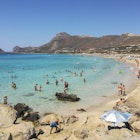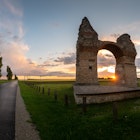
How to spend a perfect weekend in Plovdiv, Bulgaria
Jan 30, 2020 • 4 min read

A lovely ancient town in the lowlands between the Balkan and Rhodope mountains, Plovdiv is the perfect place to recharge for a couple of days if you are coming to Bulgaria for an adventure. And with a serious food and drink scene, and numerous historical and cultural sites to explore, it’s a great choice for a southern European city break in its own right. Until recently Plovdiv was almost unknown outside of Bulgaria, but received a tourism boost following its stint as European Capital of Culture in 2019. It's taken over 6000 years, but Europe’s oldest city is finally trending.
Day one

Morning
A great stay in Plovdiv starts in Kapana, the oldest part of town, and begins with a breakfast of palachinki (sweet or savoury pancakes) at Monkey House. Take a seat outside on the cobbles of ul Zlatarska, drink Plovdiv’s best coffee, and do some people-watching as the town wakes up. Afterwards, meander through the narrow streets a little more: the word kapana means “a trap”, but there is nothing sinister around the corners of this labyrinth – only more quirky hipster cafes and bakeries. Close by on ul Saborna is the City Gallery of Fine Arts, which displays sculptures, paintings and photographs by Bulgaria’s greatest artists.
Later in the morning, walk up to Plovdiv’s landmark, the 2nd-century Roman Amphitheatre on ul Tsar Ivaylo. Also known as the Ancient Theatre of Philippopolis, the site is one of the best-preserved ancient theatres in the world. These days the 6000-seat auditorium hosts many of Plovdiv’s open-air events, from operas to cultural festivals. On the way back down from the amphitheatre, step inside the Church of Sveta Bogoroditsa to listen to a Bulgarian Orthodox service.
Afternoon
For lunch, try a warm slice of banitsa (cheese-filled pastry), a plate of chushki burek (peppers stuffed with cheese), or Bulgaria’s ubiquitous shopska salad (a bowl of tomatoes, cucumbers, peppers, onion and cheese). Grazhdansky Klubb on Stoyan Chalakov street is a local favourite. Then walk a couple of streets east of Kapana, to see the most lavish example of Plovdiv’s 19th-century architecture at Balabanov House. The house used to be a mansion for a succession of wealthy Bulgarian merchants; but since being restored in the 1970s the ground floor has been an exhibition of modern Bulgarian art. Close to Balabanov House is the equally beautiful Ethnographical Museum, with a flower garden in its courtyard.
When the sun goes down, go back to the heart of Kapana, where the tiny, intimate Pavaj restaurant on ul Zlatarska creates brilliant modern dishes from locally-sourced ingredients. Depending which nightcap you fancy, stay at Pavaj to sample their selection of rakia (Bulgaria’s delicious spirit made from grapes and other fruits), go to Vino Culture – also on ul Zlatarska – to taste some local wines, or try Plovdiv’s first craft beer bar Kotka i Mishka (Cat and Mouse) on ul Hristo Dyukmedzhiev, which serves four beers from its own brewery.
Day two

Morning
Plovdiv in Bulgaria is built on seven little hills, and you can’t visit without clambering up at least one of them. So before you set off, pop in to Klebarnitsa Kapana, one of Plovdiv’s divine bakeries, to load up on carbs (try kifli – pastries filled with marmalade) and fuel up with some more potent Bulgarian espresso.
Within the old town itself is a hill named Nebet Tepe. At the top of the mound are the Ruins of Eumolpias – the remnants of an ancient Thracian settlement called Eumolpias, dating from 5000 BCE. From Nebet Tepe there is also a pretty panoramic view of Plovdiv. At the bottom of the hill are the remains of another ancient ruin, the Stadium of Philippopolis. While you are in this part of town, step inside Atanas Krastev House on Chomakov street to see another lavish example of Bulgarian architecture. Mr Krastev himself was a local painter, as well as a champion of Plovdiv’s history and culture. His house and its beautiful garden now display his portraits and collections of abstract art.
Afternoon
For lunch, get a table at Smokini on ul Zlatarska. The restaurant serves brilliant Bulgarian dishes, soups and hearty salads, with a modern international twist. For the rest of the afternoon, take a final stroll around the town. It won't take long to climb up some more of the hills; Dzhambaz Tepe and Taksim Tepe are only 100m high, but both have lovely panoramic views of the valley beneath. After you climb down, step inside Plovdiv's oldest church, the Church of Sveti Konstantin & Elena, and visit the 14th-century Dzhumaya Mosque.
At the end of your stay in Plovdiv, tear yourself away from the “trap” of the old town, and take the short walk back to the amphitheatre, to see the marble steps lit up under the stars.
You might also like:
Four scenic drives in the Balkans
Bulgaria rocks: a hiker’s guide to five geological wonders
Skiing, hiking, climbing, rafting and more: finding adventure in Bulgaria
Explore related stories






 Spirituality & ReligionFrom DIY pilgrimages to halal restaurant tips: how this travel blogger built a community of Muslim travelers
Spirituality & ReligionFrom DIY pilgrimages to halal restaurant tips: how this travel blogger built a community of Muslim travelersJan 21, 2022 • 6 min read
 Air TravelPlanning a European trip? These countries are tightening restrictions for US travelers
Air TravelPlanning a European trip? These countries are tightening restrictions for US travelersSep 10, 2021 • 5 min read


